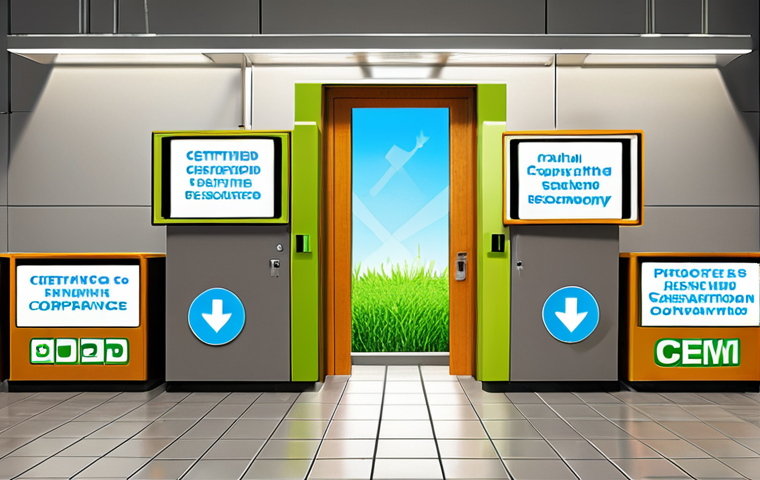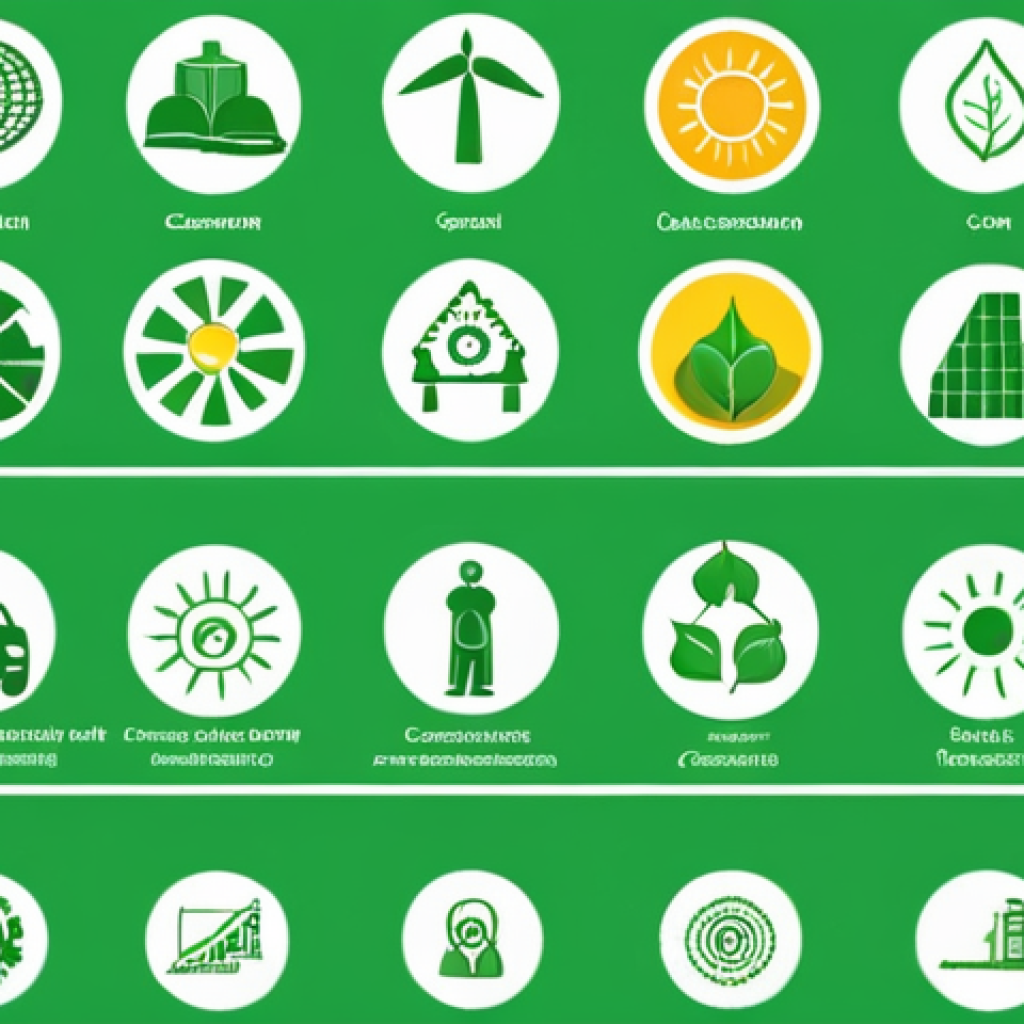It feels like just yesterday ‘going green’ was a niche concept, perhaps a fringe movement for the particularly passionate or a mere corporate buzzword.
But honestly, walking through today’s job market, or even just scrolling through my LinkedIn feed, it’s impossible to ignore the seismic shift that has occurred.
I’ve personally witnessed, firsthand, how companies across every sector are scrambling to meet increasingly ambitious ESG (Environmental, Social, and Governance) goals, not just for good PR, but because savvy consumers and institutional investors are now unequivocally demanding it, shaping the very future of investment and commerce.
This urgent pivot towards sustainability, propelled by everything from escalating climate crises to evolving global regulations and the rise of the circular economy, has created an unprecedented demand for verifiable environmental expertise.
Suddenly, holding a recognized environmental certification isn’t just a nice-to-have; it’s rapidly becoming the key differentiator, unlocking doors and fundamentally reshaping career trajectories and business strategies alike, often leading to higher earning potential and more impactful roles.
This isn’t just a passing trend; it’s a fundamental recalibration of our global economy. The landscape is shifting beneath our feet at an astonishing pace, and those with the right credentials are truly poised to lead the charge in this green revolution.
Let’s get precise information on this.
The Unmistakable Surge in Demand for Green Expertise

The energy emanating from the sustainable sector right now is palpable, almost electric. I remember clearly just a few years ago, discussing “sustainability” often felt like stepping onto a soapbox, perhaps too academic or too idealistic for the mainstream corporate world. But oh, how the tides have turned! What I’ve personally witnessed, working alongside professionals across various industries, is a profound and incredibly rapid integration of environmental considerations into core business strategies. This isn’t just about glossy annual reports; it’s about fundamental operational shifts, supply chain overhauls, and innovative product development all geared towards minimizing ecological footprints and maximizing resource efficiency. Companies aren’t just *thinking* about being green; they’re *doing* it, driven by a blend of genuine concern, regulatory pressures, and a very real understanding that sustainability is no longer a cost center but a significant competitive advantage. This paradigm shift has created an insatiable appetite for individuals who not only understand environmental principles but can also translate them into actionable, profitable strategies. It’s truly exciting to see, especially knowing the profound impact these roles are having on our collective future.
1. The Evolution of “Green Jobs”: From Niche to Necessity
It wasn’t that long ago that “environmental jobs” conjured images of field biologists or conservationists, noble and important, but perhaps not central to the bustling economic engine. My own journey, which involved a deep dive into corporate sustainability, revealed that this perception is now entirely outdated. Today, a “green job” could mean anything from a renewable energy project manager to a sustainable finance analyst, or even a circular economy strategist within a major manufacturing firm. The sheer diversity is staggering, and what ties them all together is a specialized understanding of environmental principles, often validated by formal certifications. These roles are no longer peripheral; they’re embedded directly into the strategic core of businesses, from Silicon Valley tech giants to established financial institutions in London and burgeoning manufacturing hubs in the Midwest. I’ve seen first-hand how companies, once hesitant, are now dedicating entire departments to ESG compliance, carbon footprint reduction, and sustainable supply chain management. This isn’t just a fleeting trend; it’s a fundamental re-wiring of the global employment landscape, recognizing that environmental stewardship is now inextricably linked to economic viability and resilience.
2. Driving Forces Behind the Environmental Skill Set Boom
So, what ignited this explosive demand for environmental expertise? It’s a confluence of powerful forces, really. On one hand, you have the undeniable reality of climate change and resource depletion, pushing governments worldwide to enact stricter regulations. Think about the European Green Deal or the growing net-zero commitments across North America and Asia; these aren’t just aspirational goals, they’re creating binding legal frameworks that companies must navigate. On the other hand, there’s a generational shift in consumer values. Millennials and Gen Z, in particular, are not just saying they care about sustainability; they’re actively choosing brands and employers that align with their eco-conscious values, often willing to pay a premium for truly sustainable products. And let’s not forget the financial sector. Major institutional investors are increasingly incorporating ESG factors into their investment decisions, effectively redirecting trillions of dollars towards companies with strong sustainability performance. I’ve witnessed countless boardrooms where the discussion has shifted from “if” to “how quickly” they can integrate sustainable practices. This pressure, coming from all angles—regulatory, consumer, and financial—is why the need for certified environmental professionals is not just a want, but an absolute strategic imperative for businesses of all sizes.
Translating Credentials into Tangible Career Momentum
Holding an environmental certification isn’t just about adding a fancy acronym to your resume; it’s about showcasing a verified skill set that directly addresses critical business challenges. I remember the moment it truly clicked for me: I was working on a project where we needed to implement a new waste diversion program for a large facility. Having colleagues with specific certifications in waste management and circular economy principles meant we weren’t just guessing; we were applying proven methodologies, understanding compliance nuances, and identifying cost-saving opportunities that would have been invisible otherwise. This isn’t theory; it’s practical application, demonstrating that you can bridge the gap between abstract environmental concepts and concrete business outcomes. When companies are looking to reduce their carbon footprint, optimize energy consumption, or navigate complex environmental regulations, they’re not just looking for someone who “cares about the environment.” They’re looking for someone who knows *how* to do it, someone who can lead the charge with verifiable expertise.
1. Opening Doors to Specialized Roles and Leadership
One of the most immediate benefits I’ve observed is how these certifications act as a powerful differentiator in a competitive job market. In a recent hiring cycle, I saw two equally enthusiastic candidates for a sustainability manager role. One had general experience, while the other had specific certifications in LEED (Leadership in Energy and Environmental Design) and ISO 14001. The latter not only stood out but could articulate precisely how their expertise would drive tangible value, from reducing energy costs in our buildings to streamlining our environmental management systems. It’s not just about getting hired; it’s about being positioned for leadership. Professionals with these credentials are often tasked with spearheading new initiatives, advising senior leadership, and training internal teams. They become the go-to experts, which naturally leads to more impactful roles, greater responsibilities, and, let’s be honest, often a healthier paycheck. The market values proven knowledge, and certifications are a clear signal of that.
2. Enhanced Credibility and Industry Recognition
Beyond the job market, the credibility these certifications bestow is immense. When you walk into a meeting with clients, partners, or even regulators, and you can back up your recommendations with an internationally recognized credential, it changes the dynamic entirely. It’s not just your opinion; it’s validated expertise. I’ve seen how a certified professional can quickly build trust and authority, often becoming an indispensable advisor. This recognition extends beyond your immediate team. Industry peers, professional organizations, and even potential collaborators recognize the rigor and commitment required to achieve these certifications. It’s a statement that you are serious about your craft, committed to continuous learning, and capable of delivering high-quality, compliant, and impactful results. This collective recognition within the industry can lead to speaking engagements, publishing opportunities, and a network of highly skilled professionals, further cementing your authority and influence.
Deciphering the Labyrinth of Environmental Certifications
The world of environmental certifications can feel a bit like a sprawling, dense forest at first glance, with countless pathways branching off in every direction. When I first started exploring this space, I felt overwhelmed by the sheer number of options. There are certifications focusing on energy management, waste reduction, sustainable supply chains, environmental law, renewable energy, and so much more. It’s crucial to understand that not all certifications are created equal, nor are they all relevant to every career path. The key is to strategically identify the credentials that align most closely with your career aspirations and the specific needs of the industries you’re targeting. Are you passionate about sustainable building? LEED or WELL AP might be your calling. Interested in corporate social responsibility? Certifications like CSR-P (Certified Sustainability Reporting Professional) could be invaluable. Understanding the nuances of each, and how they apply in real-world contexts, is paramount to making an informed decision that truly advances your career. It’s an investment, after all, and you want that investment to yield maximum returns.
1. Navigating Industry-Specific Accreditations
Many of the most impactful environmental certifications are highly specialized, designed to equip professionals with deep knowledge in particular sectors. For instance, if you’re eyeing a role in green construction, certifications like LEED AP (Accredited Professional) or BREEAM Assessor are gold standards. These aren’t just generic sustainability courses; they delve into the intricate details of sustainable building materials, energy efficiency in design, indoor environmental quality, and responsible site development. Similarly, for those passionate about energy, the Certified Energy Manager (CEM) credential opens doors to roles focused on optimizing energy use in commercial and industrial settings, a skill set desperately needed as companies strive to reduce operational costs and carbon emissions. My advice, based on what I’ve seen work for countless colleagues, is to pinpoint your niche and then seek out the most reputable and recognized certifications within that specific area. This targeted approach ensures that your expertise is both deep and highly relevant to the demands of that industry.
2. Broader Frameworks and Foundational Credentials
While specialization is vital, some certifications offer a broader, more foundational understanding of environmental management principles, which can be incredibly useful for a range of roles or for those still exploring their specific path. Certifications like ISO 14001 Lead Auditor, for example, teach you the ins and outs of establishing, implementing, maintaining, and improving an environmental management system (EMS) within an organization. This isn’t about one specific environmental issue but rather a holistic framework for managing environmental impacts, risks, and opportunities across an entire enterprise. I’ve personally found that understanding these broader frameworks provides a robust backbone for any environmental professional, allowing you to see the bigger picture and connect seemingly disparate sustainability initiatives. For those looking for an entry point or a comprehensive overview, these foundational credentials can provide an invaluable base upon which to build more specialized expertise down the line.
Real-World Impact: How Certifications Drive Sustainable Change
This is where the rubber truly meets the road. It’s one thing to talk about sustainability; it’s another entirely to implement it effectively, measure its impact, and ensure it contributes positively to both the planet and the bottom line. Environmental certifications don’t just teach you theories; they equip you with the practical tools and methodologies to drive tangible, measurable change. I’ve been fortunate enough to witness numerous projects where certified professionals translated their knowledge into real-world solutions. From reducing water consumption in manufacturing plants by 30% to designing office buildings that generate more energy than they consume, the impact is profound and inspiring. These are not small wins; these are significant shifts that contribute directly to a more sustainable future while often delivering substantial financial savings and enhanced brand reputation for the businesses involved. It’s a powerful testament to the idea that doing good for the environment can also be good for business.
1. Implementing Best Practices and Operational Efficiencies
One of the most immediate impacts I’ve seen from certified professionals is their ability to identify and implement operational efficiencies. For example, a certified energy auditor can walk into a facility and pinpoint exactly where energy is being wasted, whether it’s inefficient HVAC systems, outdated lighting, or unoptimized processes. They don’t just point out problems; they propose concrete solutions, often backed by detailed cost-benefit analyses, which can lead to significant reductions in utility bills and carbon emissions. Similarly, a professional certified in waste management can revamp an organization’s waste streams, introducing advanced recycling programs, composting initiatives, or even designing processes to minimize waste generation at the source. This isn’t just about compliance; it’s about smart business. These tangible improvements directly contribute to a company’s financial health, illustrating that environmental responsibility isn’t just an expense but a pathway to leaner, more resilient operations. It truly warms my heart to see these real-world transformations unfold.
2. Driving Innovation and Sustainable Product Development
Perhaps even more exciting is how environmental expertise fuels innovation. I’ve been part of brainstorming sessions where certified materials specialists offered insights into using recycled content in new products, or where life cycle assessment (LCA) experts guided the design of products to minimize their environmental impact from “cradle to grave.” This goes beyond just compliance; it’s about proactively creating better, more sustainable products and services. Companies are increasingly seeking professionals who can not only manage environmental risks but also identify new opportunities arising from the green transition. This could involve developing biodegradable packaging, designing circular economy models for product take-back and reuse, or pioneering new renewable energy solutions. Certifications in areas like sustainable product design or circular economy principles are becoming vital for those looking to be at the forefront of this green innovation wave. It’s about being visionary, not just reactive, and that’s incredibly empowering.
Future-Proofing Your Professional Toolkit in the Green Economy
If there’s one thing I’ve learned over the past few years, it’s that change is the only constant, especially in the realm of environmental sustainability. What might be considered best practice today could be outdated tomorrow as new technologies emerge, regulations evolve, and scientific understanding deepens. This is precisely why investing in environmental certifications isn’t just about immediate career gains; it’s about future-proofing your professional toolkit. These credentials often require ongoing education or recertification, forcing you to stay abreast of the latest advancements, emerging risks, and innovative solutions. In a rapidly evolving green economy, continuous learning isn’t a luxury; it’s a necessity for relevance and sustained impact. I’ve seen too many professionals get left behind because they didn’t adapt. The ones who thrive are those who are constantly updating their knowledge and skills, ensuring they remain indispensable as the environmental landscape continues its dynamic shift.
1. Staying Ahead of Evolving Regulations and Technologies
The regulatory landscape around environmental issues is a constantly moving target. From carbon pricing mechanisms to new standards for industrial emissions, keeping up can feel like a full-time job in itself. Environmental certifications, particularly those with a strong emphasis on compliance and regulatory frameworks, ensure you are always equipped with the most current knowledge. This is invaluable, as non-compliance can lead to hefty fines, reputational damage, and operational shutdowns. Beyond regulations, technological advancements are reshaping how we approach sustainability. Think about advancements in carbon capture, smart grid technologies, or advanced recycling methods. Professionals with certifications are often plugged into these innovations, understanding their potential and how to integrate them into existing systems. I remember a discussion where a colleague, who had just completed a new energy efficiency certification, shared insights into a new heat recovery system that none of us had considered. That insight alone saved us significant energy costs and demonstrated the immense value of staying current.
2. Building Resilience and Adaptability in Your Career
Perhaps one of the most underrated benefits of pursuing environmental certifications is the resilience and adaptability they foster. The environmental field inherently deals with complex, interconnected problems that require critical thinking, problem-solving, and a multi-disciplinary approach. The rigorous training and examination processes for these certifications hone these very skills. They teach you not just *what* to think, but *how* to think about complex environmental challenges, preparing you to tackle unforeseen issues and adapt to new paradigms. In a world increasingly defined by uncertainty – climate shocks, resource scarcity, shifting consumer demands – professionals who can nimbly navigate these complexities will be the most valuable. I’ve found that the confidence gained from mastering a specialized environmental domain equips you with a profound sense of professional security, knowing that your skills will remain in high demand regardless of what the future holds.
Leveraging Your Expertise for Broader Influence and Financial Growth
Let’s be frank: while passion for the planet drives many, the practical realities of career advancement and financial stability are crucial. The good news is that environmental expertise, especially validated by reputable certifications, is increasingly translating into significant financial upside and expanded professional influence. I’ve personally observed colleagues receiving substantial raises, being headhunted for lucrative positions, and even successfully launching their own consultancies, all propelled by their specialized environmental credentials. This isn’t just about earning more; it’s about leveraging your knowledge to drive larger-scale change, command respect, and truly shape the future of industries. The demand is so high that employers are often willing to pay a premium for professionals who can effectively navigate the complex world of ESG, reduce operational risks, and identify new green market opportunities. It’s a powerful combination: doing good for the Earth while also doing well for yourself.
1. Identifying Premium Salary Opportunities and Consultancies
The market speaks volumes, and right now, it’s shouting for environmental professionals. Data consistently shows that individuals with specialized environmental certifications often command higher salaries than their uncertified counterparts. This is because these certifications signify a proven level of expertise that directly translates into value for employers—be it through cost savings from efficiency gains, risk mitigation from compliance, or unlocking new revenue streams from sustainable products. Moreover, for those with an entrepreneurial spirit, these credentials can be the bedrock for a successful consulting career. I know several certified environmental consultants who are thriving by helping companies navigate their sustainability journeys, from conducting carbon footprint assessments to developing comprehensive ESG strategies. Their certifications lend immediate credibility, allowing them to charge premium rates and secure high-value contracts. It’s a testament to the idea that specialized knowledge truly is power, both in terms of impact and income.
2. Expanding Your Sphere of Influence and Thought Leadership
Beyond direct financial gains, environmental certifications significantly expand your professional influence and opportunities for thought leadership. When you’ve rigorously studied and mastered a specific environmental domain, you become an authoritative voice. This naturally leads to invitations to speak at industry conferences, contribute to white papers, or even advise governmental bodies on policy. I’ve seen how colleagues, initially focused on internal company projects, quickly became recognized experts in their respective fields, shaping broader industry conversations and influencing decisions far beyond their immediate roles. This kind of influence is invaluable. It positions you not just as an employee, but as a leader, someone who can genuinely move the needle on critical environmental issues. It’s incredibly rewarding to know that your expertise can contribute to a larger, more sustainable vision, impacting not just one company, but potentially entire sectors.
The Human Element: My Personal Journey Towards Certification
It feels almost poetic, looking back at my own journey into the world of environmental certifications. There was a point, honestly, where I felt a little lost, perhaps even overwhelmed by the enormity of global environmental challenges. I wanted to contribute, to make a difference, but I wasn’t quite sure how to translate that passion into a concrete professional path. That’s where the idea of formal certification began to truly resonate with me. It wasn’t just about accumulating more knowledge; it was about sharpening my focus, validating my commitment, and gaining the practical tools that would allow me to move beyond theoretical discussions into real-world action. I distinctly remember the sense of accomplishment, and dare I say, relief, when I finally earned my first major environmental credential. It wasn’t just a piece of paper; it was a profound shift in my professional identity and a clear signal to myself, and to the world, that I was serious about driving sustainable change.
1. From Passion to Purpose: Finding My Niche
My initial fascination with environmental issues was broad—everything from renewable energy to plastic pollution captured my attention. But as I started looking into various certifications, it became clear that I needed to narrow my focus to truly excel. I spent weeks researching, talking to professionals in different fields, and reflecting deeply on what specific area of sustainability truly ignited my passion and aligned with my existing skills. For me, it gravitated towards corporate sustainability strategy and reporting. The idea of helping businesses integrate environmental responsibility into their core operations, not just as an afterthought but as a strategic imperative, deeply resonated. This process of self-discovery, guided by the structure that certifications offer, was invaluable. It helped me realize that while every aspect of sustainability is vital, finding your specific niche allows you to become an expert, not just a generalist. This journey from broad passion to defined purpose was transformative, and I believe it’s a critical step for anyone considering this path.
2. The Unexpected Benefits Beyond the Certificate
While the primary goal of pursuing a certification is, of course, to gain recognized expertise, I discovered a myriad of unexpected benefits along the way. The community, for one, was an incredible surprise. Studying for these exams connected me with a network of like-minded professionals—engineers, scientists, business leaders—all striving for similar goals. These connections have proven to be an invaluable resource, providing mentorship, collaboration opportunities, and even friendships that extend beyond professional boundaries. Furthermore, the rigorous process of preparing for the exams itself taught me discipline, resilience, and a new way of thinking about complex problems. It wasn’t just memorizing facts; it was about developing a systemic understanding, learning to dissect issues, and constructing practical solutions. I truly believe that the journey of pursuing these certifications, with all its challenges and triumphs, can be as enriching as the destination itself, equipping you with a robust set of skills and a confident mindset that extends far beyond the specific subject matter.
| Certification Focus Area | Key Benefits for Professionals | Typical Industries/Roles Benefiting |
|---|---|---|
| Sustainable Building & Infrastructure |
|
Architects, Engineers, Construction Managers, Real Estate Developers, Facilities Managers |
| Environmental Management Systems (EMS) |
|
Environmental Managers, Compliance Officers, Operations Managers, Quality Assurance |
| Renewable Energy & Energy Efficiency |
|
Energy Managers, Renewable Energy Developers, Sustainability Consultants, HVAC Engineers |
| Corporate Sustainability & ESG Reporting |
|
Sustainability Analysts, CSR Managers, ESG Consultants, Investor Relations, Corporate Communications |
| Circular Economy & Waste Management |
|
Product Designers, Supply Chain Managers, Operations Directors, Waste Management Specialists |
Wrapping Up
Stepping back and looking at the landscape, it’s abundantly clear that the professional world is undergoing a profound green transformation. What was once considered a niche interest is now a core strategic imperative for businesses of all sizes, across every sector imaginable. My journey, and indeed the journeys of countless colleagues I’ve witnessed, has shown me that investing in environmental certifications isn’t just a smart career move; it’s a powerful statement of intent. It’s about equipping yourself with the verified knowledge and practical skills to genuinely contribute to a more sustainable future, while simultaneously unlocking unparalleled career growth and financial opportunities. The impact you can make is immense, and the time to act is now.
Useful Information
1. Research Deeply: Before committing to a certification, thoroughly research the specific industry or role you’re targeting. Different sectors value different credentials, so align your choice with your career aspirations.
2. Check Accreditation: Always verify that the certification body is reputable and widely recognized within the industry. Look for accreditations that signify quality and rigor in their program.
3. Consider Format: Many certifications offer flexible learning options, from intensive bootcamps to self-paced online courses. Choose a format that best suits your learning style and current schedule.
4. Network Actively: Connect with professionals who already hold the certifications you’re interested in. Their insights can be invaluable for understanding exam preparation, career applications, and industry trends.
5. Explore Funding: Look into potential scholarships, grants, or employer-sponsored training programs that might help cover the cost of certification. Many companies are now investing in upskilling their teams in sustainability.
Key Takeaways
The demand for green expertise is booming, driven by regulations, consumer values, and investor pressure.
Environmental certifications validate skills, opening doors to specialized roles and leadership positions.
They enhance professional credibility and industry recognition, fostering trust and authority.
These credentials equip professionals to implement sustainable best practices and drive innovation.
Investing in certifications future-proofs your career, ensuring you stay relevant with evolving green technologies and regulations.
Validated expertise translates into premium salary opportunities and expanded influence as a thought leader.
Personal passion combined with targeted certification leads to purpose-driven career growth and unexpected professional benefits.
Frequently Asked Questions (FAQ) 📖
Q: Given the rapid shift you described, why are environmental certifications becoming such an absolute game-changer in today’s professional landscape?
A: Honestly, it feels like we blinked and suddenly ‘green’ wasn’t just a buzzword for annual reports, but a non-negotiable for success. From what I’ve seen, it’s a powerful trifecta: consumers are way savvier now, demanding transparency and real action, not just vague promises.
Then you have institutional investors, who are literally putting their money where the planet is, scrutinizing ESG performance like never before. And finally, companies themselves are realizing this isn’t just PR; it’s about staying competitive and attractive to top talent.
Holding a recognized environmental certification isn’t just a ‘nice-to-have’ anymore; it’s proving you have the tangible skills and commitment needed to navigate this complex, evolving landscape.
It’s truly a differentiator, the kind that opens doors to those higher-impact roles and, let’s be real, often better paychecks.
Q: You mentioned ESG demands reshaping careers and business strategies. How exactly is this playing out on the ground for individuals and companies?
A: It’s fascinating, almost like watching an entire economic system reconfigure itself in real-time. For individuals, I’m personally seeing a surge in demand for roles that didn’t even exist five years ago – think Chief Sustainability Officers, ESG analysts, circular economy specialists, or even ‘green’ supply chain managers.
Companies, on the other hand, aren’t just ticking boxes; they’re fundamentally reassessing their entire value chains. They’re investing heavily in R&D for sustainable products, overhauling operations to reduce emissions, and genuinely trying to embed environmental and social responsibility into their core business model.
This isn’t just about avoiding fines; it’s about future-proofing. If you’re a business, you’re either part of this shift or you’re getting left behind.
It’s a make-or-break moment for many established industries, and the folks with that verifiable expertise? They’re becoming indispensable.
Q: With all this talk about a ‘green revolution,’ is this genuinely a fundamental shift, or could it simply be a passing trend that fades away?
A: Oh, trust me, this isn’t some fleeting fad or a corporate flavor-of-the-month. I’ve been in this space long enough to see fads come and go, but this feels entirely different.
The drivers behind it – escalating climate crises pushing governments and populations to act, evolving global regulations that are getting stricter by the day, and the undeniable economic logic of the circular economy – these aren’t going anywhere.
This isn’t just about ‘doing good’ anymore; it’s about economic survival and competitive advantage. The capital markets are already heavily skewed towards sustainable investments, and consumer preferences are permanently altered.
This is a fundamental recalibration of how our global economy operates, a systemic shift that’s truly here to stay. Anyone betting on it being a temporary wave is, quite frankly, missing the boat entirely.
📚 References
Wikipedia Encyclopedia
구글 검색 결과
구글 검색 결과
구글 검색 결과
구글 검색 결과
구글 검색 결과






